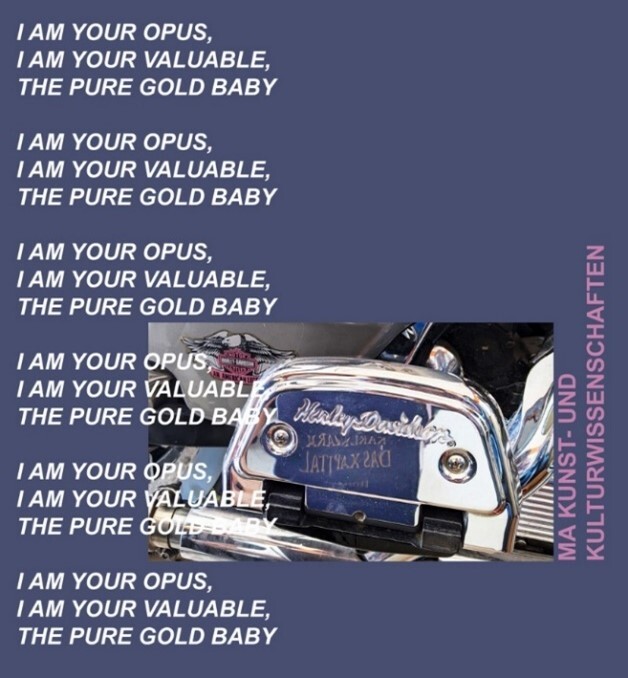I am your opus, I am your valuable, the pure gold baby
Artists
Curators
Date, Location
- 28 June 2022–01 July 2022 Universität für angewandte Kunst in Wien, Wien, Österreich
General Text
The idea to create a festival contribution along this theme was closely linked to the seminar 'The Fetish', which we took with Antonia Birnbaum and Amanda Holmes. The problematic of the term 'fetish' appeared firmly inscribed in the discourses of modernity on several levels, while at the same time it remains more diffuse than any other. Our exhibition I am your opus, I am your valuable, the pure gold baby therefore wants to negotiate what a fetish is and what is at stake in thinking it. Part of the problem of 'fetish' is the ambivalence that is the content and characteristic of the term itself. The concept of 'fetishism' often implies ambiguity and disavowal (the simultaneous belief in the truthfulness and falsity of something). An object is imbued with meaning and power; in it, social relations are objectified in a distinctive way and concealed at the same time. 'Fetishism' in this sense is an essential part of the West's story about reason, commodity, and sex. The roots of the term lie in the non-encounter between the Portuguese colonial power and the people of the Congo. There, feitiço referred to a 'superstitious charm or magical medicine,' intended to protect the wearer of the fetish object from interference by evil forces. The early theorists of fetishism recognized in this merely a 'religious superstition', one that was deemed long outdated in Europe. 'Fetishism' thus became a symbol of an assumed European cultural superiority and an expression of concrete power relations. Thereby, the 'other' is given its form in the fetish. If the fetish is about the enlivenment of an object by imbuing it with 'magical' qualities, then we find a similar 'enchantment of the object' in the capitalist commodity world. The fetish character of the commodity as introduced by Marx implies a phantasm, a mystical content beyond the physical object character of the commodity. The logic of the fetish is thereby characterized by a surplus by which the object is encompassed. This symbolic surplus cannot simply be seen, it takes place 'outside of the eye'. It is in this context that we must consider the Harley Davidson, which stands in conjunction with Kenneth Anger's Film Scorpio Rising in the center of the room: The motorcycle is more than just metal welded together, more than just a means of transportation. It is charged by its meaning within social relations and inversely animates them: in male bonds like the Hell's Angels, the Harley becomes the epitome of a masculinity that, for all its patriarchal violence, is nonetheless homoerotically charged. As a counterpoint, Lisa Vötter and Anna Schmitzberger show in their ceramic works, a fetish is a fetish is a fetish, everyday objects that have lost their use-value. Now pure exchange-value, shiny surface, they become a fetish in its purest form: a work of art. As a central concept of the Enlightenment, the concept of fetishism marked and structured essential distinctions: between the rational and the irrational, the supposedly civilized and the so-called 'primitive', the normal and the abnormal. In a similar vein, Freudian psychoanalysis adapted the fetish to draw boundaries of 'normal' and 'deviant' sexuality: This use of the term is probably the one we are most familiar with today. In this context, the exhibition does not only look at pleasure, but questions the pleasure in looking. The camera as a medium and film as an artifact explore the phenomena of voyeurism and scopophilia (the desire to look and in looking) in a particularly striking and self-reflexive way. In Jean Genet's film Un Chant d'Amour, the viewer is confronted not only with the desire of the men depicted, but also with their own. If we take into consideration a quote by Raymond Corby in this context - "sexual pleasure begins with the privilege of sight" - we have to ask ourselves what point of view we ourselves take; not only in consideration of the film, but also in our general, everyday lives. In his painting Golden Baby, Lucijan Osvald takes up this thematic conflict in a very unique way. Text: Rebecca Stephanie Schmidt
Opening
2022-06-28 11:00-21:00

Location
Address
- Universität für angewandte Kunst in Wien, Wien, Österreich
- Oskar-Kokoschka-Platz 2
- 1010 Wien
- Österreich
Associated Media Files
 Image#1
Image#1 Image#2
Image#2

